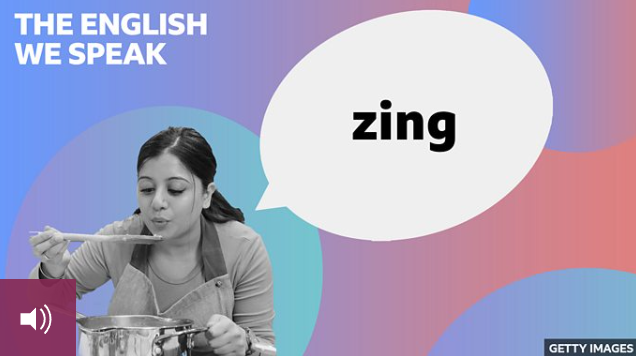Introduction
Here’s a word to describe something exciting. Find out how to use it in this programme.
Transcript
Neil
Welcome to The English We Speak, with me Neil…
Feifei
And me, Feifei.
Neil
In this episode, we’re going to look at a word that is all about excitement – it’s ‘zing’.
Feifei
‘Zing’. People might not have heard this one. How do we use it?
Neil
So ‘zing’ is something special that some things have that’s hard to describe, but makes them more interesting or exciting. I can also tell you something that doesn’t have any zing – that’s my lunch. It’s just a plain cheese sandwich.
Feifei
What you need for that is some chillies – that’ll give you a bit of zing.
Neil
Chillies? Hmm that might be a bit too much zing. Now, zing isn’t just about food, is it?
Feifei
No, it could even be about the way you feel. I was feeling a bit down yesterday, but then I booked a holiday, and that’s given me a bit of zing. I feel so much better now I’ve got something to look forward to.
Neil
It’s good to feel a bit of zing. Listen to these examples.
Examples
That song is OK, but it needs a bit more zing – can you make it a bit more exciting?
We’re going to bring you a show that’s full of zing. It’s going to be spectacular.
Since the goal, the game’s gone a bit flat – there’s no zing.
Feifei
You’re listening to The English We Speak from BBC Learning English, and we are learning the word ‘zing’, which is about excitement, energy, or interest.
Neil
It may originally have been onomatopoeia, which is a word that sounds like what it describes. ‘Zing’ might have been the sound of something moving fast with a lot of energy.
Feifei
In informal language, we use onomatopoeia a lot. For example, if something is a bit weak and needs more energy, we can say it needs a bit more ‘oomph’.
Neil
In this example ‘oomph’ is force or energy. ‘Zing’ might be a bit more exciting, but they are similar.
Feifei
If you want a bit more zing in your English, join us for the next episode. See you then! Bye!
Neil
Goodbye!
